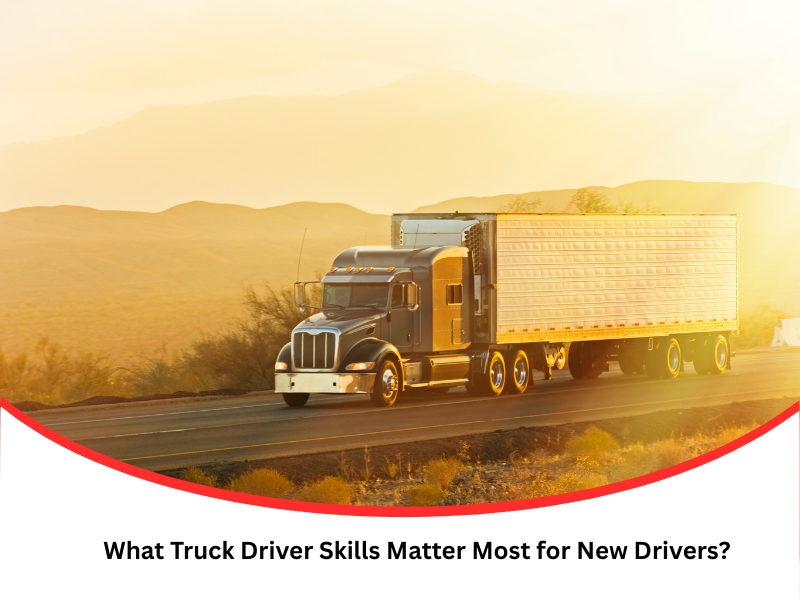Starting your career as a truck driver demands more than just holding a licence. A solid foundation of truck driver skills is required to ensure safety and efficiency on the road. Trucking entails significant responsibilities, including navigating complex traffic and handling massive loads over long distances. This article explores the essential skills new drivers need to develop to navigate the challenges of the trucking industry confidently. Whether you’re behind the wheel of a small rigid or a fully loaded multi-combo, the right skillset can mean the difference between a smooth haul and a risky situation.
How do weak truck driver skills put others at risk?
Without proper training, weak truck driver skills can turn a routine delivery into a major hazard. When a driver lacks control, judgment, or awareness, it’s not just their own safety at stake—it’s everyone around them. These shortcomings can show up in several critical ways:
- Poor vehicle control during lane changes and turns
- Inadequate hazard perception at intersections or work zones
- Improper load securing that causes rollovers or cargo spills
- Failure to adhere to safety protocols under pressure or fatigue
The risk multiplies when you factor in long hours, heavy loads, and unpredictable traffic. That’s why it’s essential to start by developing truck driver skills for safer road habits that hold up even under stress.
What are the foundational truck driver skills for beginners?
Strong fundamentals give you the confidence to handle challenging conditions and tough decisions on the road. These aren’t fancy or advanced skills—they’re the basics that every driver needs nailed down before anything else. Here are the essentials every beginner should prioritise:
- Vehicle inspection and maintenance to keep your rig in top shape—this includes essentials like checking tyre pressure, fluid levels, and visibility aids. Knowing how to clean your car’s windscreen for safety ensures you maintain a clear view of the road, especially during long hauls or in bad weather.
- Clear understanding of road rules specific to heavy vehicles
- Confident communication with schedulers, clients, and support staff
- Time management and navigation skills to avoid delays and detours
It’s not enough to know these—what matters is being able to apply them under pressure. Training environments that mirror real-world conditions will always give you the edge. Mastering these foundational skills early will also make learning more advanced manoeuvres much easier down the track.]
Why do inexperienced drivers find vehicle control challenging?
When you’re behind the wheel of a heavy vehicle for the first time, even basic manoeuvres can feel awkward. Truck dimensions, load weight, and braking systems behave in no way like those of a regular car. That’s why many learners struggle with vehicle control early on. You might run into issues like:
- Turning too wide or too tight in tight city corners
- Inconsistent braking that leads to hard stops or roll-backs
- Misjudging clearance under bridges or in tight laneways
- Unstable reversing and coupling in loading zones
Confidence comes from repetition, but it must be guided and nurtured. That’s where it makes sense to discover reliable training at a qualified driving school that builds these skills safely and step-by-step. Good training provides you with the hands-on time needed to transform hesitation into muscle memory.

How can learners quickly build core truck driver skills?
New drivers don’t need years to get good, but they do need the right approach. Rushing in with patchy experience or inconsistent coaching won’t build skill; it builds bad habits. Here’s how learners can make progress quickly:
- Start with structured lessons that focus on core competencies
- Work with a mentor driver who can provide real-time feedback
- Practice difficult manoeuvres regularly in varied settings
- Break skills into categories like control, safety, and compliance
Taking time to understand the importance of safety in truck driving isn’t just smart—it’s essential. Real progress happens when learners focus on quality, not speed.
Can Proper Training Improve Truck Driver Skills?
Quality training is more than ticking boxes for a licence. It fosters habits, reinforces a safety culture, and prepares drivers for real-world success. A rushed or minimal course won’t provide the same depth of understanding. With the right training program, you’ll benefit from:
- Immediate feedback on technique and judgment
- Exposure to a range of road and traffic conditions
- Preparation for inspections, audits, and compliance checks
- A steady foundation in fatigue management and load restraint
That’s why proper instruction goes beyond the basics—it teaches you how to adapt. You’ll also develop important safety habits for new truck drivers that will serve you well for years to come.
Are there skill differences based on the truck type you learn on?
Not all training experiences are the same. The truck you learn on can shape your skills in ways you might not expect. Larger rigs and specialised vehicles demand different techniques and confidence levels. Consider these variations:
- Learning on a manual truck builds stronger clutch control and timing
- Starting in a heavy rigid (HR) offers a better handling experience in urban traffic
- Training on a multi-combination vehicle (MC) introduces complex coupling and reversing
- Using newer models with advanced technology helps with automated systems, but it lessens the need for manual judgment.
Skill Focus by Licence Class
Licence Class | Key Skills Focused | Typical Vehicle | Control Difficulty |
LR | Urban handling, speed control | Small delivery trucks | Low |
MR | Load management, road rules | Medium rigid trucks | Medium |
HR | Reversing, turning, heavy loads | Large rigid vehicles | High |
HC/MC | Multi-trailer operation, coupling | Road trains, B-doubles | Very High |
Choosing your training vehicle wisely gives you a leg up. It’s smart to align this choice with your long-term goals and licence requirements. Whether you aim for metro delivery or long-haul freight, training on the right truck makes that path easier to follow.
How do confident truck driver skills lead to safer roads?
Truck safety doesn’t come from rules alone—it comes from skilled, alert, and confident drivers. When a driver knows their vehicle inside out, they make quicker decisions and avoid critical mistakes. Stronger skills contribute to:
- Lower accident risks from smart braking and hazard response
- More predictable traffic patterns as drivers maintain steady speeds
- Reduced stress for all road users due to calm, consistent driving
- Faster recovery from unexpected events like blown tyres or bad weather
It’s not just about following protocols—it’s about owning your role on the road. You’ll find that even minor improvements can make a big difference when they’re backed by experience. As confidence grows, you begin to act with purpose, rather than react under pressure.
Final thoughts
If you’re starting out as a driver, it’s worth building your skills with intention. Truck driver skills don’t just help you pass a test—they shape your career. From safety to compliance to confidence behind the wheel, they touch every part of your day.
Whether you’re preparing for your first run or stepping up to a bigger vehicle, explore training options with Core Truck Driving School to learn the practical skills that matter on real roads.


